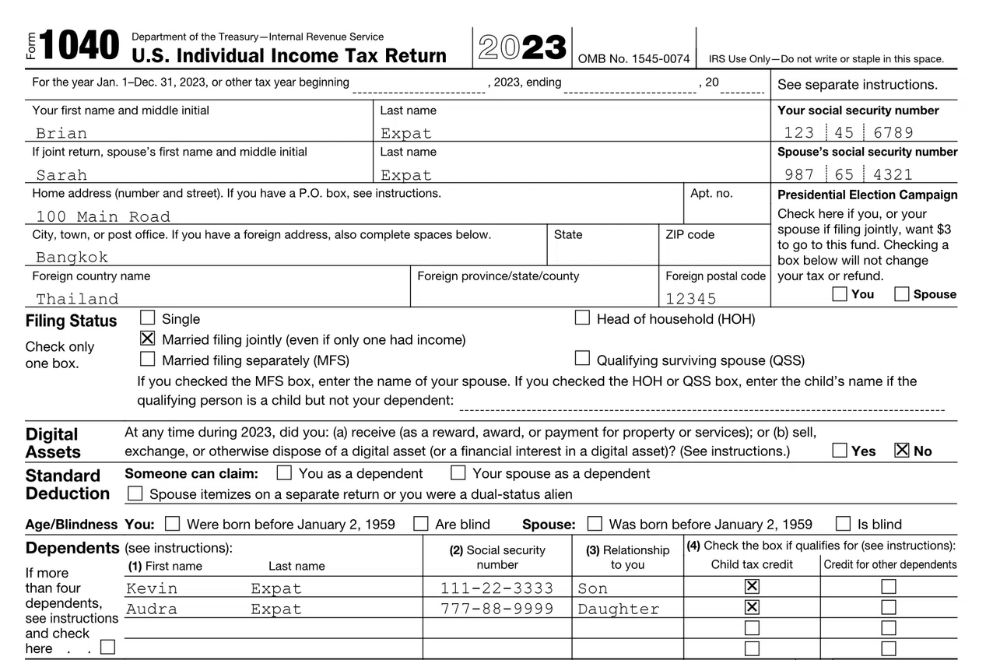How To Report Foreign Income Without a W-2

- What Is a W-2?
- Who Needs a W-2?
- Who Doesn’t Need a W-2?
- When Should I Receive My W-2?
- What If I Never Received a W-2?
- How to File Your Taxes without a W-2
- How to Report Foreign Income without a W-2
- Independent Contractors for Foreign Companies: Effectively Connected Income
- Want To File Your Expat Taxes Without a W-2? We Can Help!
For most Americans, IRS Form W-2 is the most crucial tax document when filing their federal tax return. However, if you’re an expatriate living abroad, you may not receive a W-2—especially if you work for a foreign employer.
How do you file taxes without a W-2? Does that mean you can’t file a US tax return? Not at all!
Reporting foreign income without a W-2 can be confusing, but Greenback Expat Tax Services makes it simple. Our team collectively has decades of experience helping Americans abroad tackle their unique tax challenges. We’re experts in handling expat taxes, including situations where a W-2 isn’t issued. At Greenback, we specialize in making sense of complex international tax laws and ensuring you comply with IRS requirements.
Here’s a tax guide on how to file your US expat taxes without a W-2 and avoid double taxation.
Key Takeaways
- W-2s are the standard method for reporting employment income on your US tax return.
- The W-2 is only for traditional employment income and may not apply to business owners, independent contractors, and other self-employed taxpayers.
- US citizens, resident aliens, or nonresident aliens working abroad for a foreign employer generally are not required to withhold Social Security or Medicare taxes.
- Expats may be eligible for tax benefits such as the Foreign Tax Credit (FTC) or the Foreign Earned Income Exclusion (FEIE).
What Is a W-2?
The W-2 is a form that US employers must fill out with information about their employees’ annual income and any taxes that were withheld during the year. It may also contain further details about the employee’s finances, such as:
- Tips received
- Contributions made to a 401(k)
- Contributions made to a health savings account
- Health insurance premiums covered by the employer

Social Security and Medicare Tax Withholdings
Individuals who qualify as US citizens, resident aliens, or nonresident aliens working abroad for a foreign employer generally are not required to withhold Social Security or Medicare taxes. This exemption applies because foreign employers typically do not fall under US Social Security and Medicare tax jurisdiction.
However, suppose you work for an American employer with a foreign subsidiary. In that case, the employer may require that Social Security and Medicare taxes be withheld from the employees of the foreign subsidiary. These withholdings would appear on your W-2.
There are exceptions to this rule, such as when there is a totalization agreement between the US and a foreign country.
These international agreements prevent double taxation of income with respect to social security taxes and ensure benefit protection for workers who divide their careers between two countries. Totalization agreements specify which country’s social security system will cover an individual’s employment.
Who Needs a W-2?
W-2s are the standard method for reporting employment income on your US tax return. Usually, an employer will complete this form and send it to every employee. But as an expat living overseas, you will typically only receive a W-2 if you are employed by a company based in the US. You will probably not receive a W-2 if:
- A foreign company employs you.
- An overseas branch or subsidiary of a US company employs you.
Regardless, as a US citizen, you are still required to report your worldwide income—both US-source and foreign-source.
Who Doesn’t Need a W-2?
Not every type of income must be—or can be—reported using a W-2. The W-2 is only for traditional employment income and may not apply to business owners, independent contractors, and other self-employed taxpayers.
When Should I Receive My W-2?
If you are eligible for a W-2, the IRS requires that your employer send it to you by January 31st. If your employer fails to do so, they could face penalties.
The January 31st deadline refers to when your employer must send you your W-2. It may arrive a little later, typically in the first week of February. (Employers can also send a W-2 electronically, which will be much faster.)
What If I Never Received a W-2?
As mentioned above, not all expats will receive a W-2. However, many countries have their own equivalent. Some examples include:
- Great Britain: Form P60
- Canada: T4 Slip
- Australia: PAYG Payment Summary
- Germany: Ausdruck der Lohnsteuerbescheinigung
- Japan: Gensen-Choshu-Hyo
- France: Code General des Impots
These forms will show your income and tax information in the foreign currency used by that country, so you would need to convert the amounts to US dollars to report them on your US tax return.
US tax returns must report income based on the calendar year from January 1st to December 31st. Not all countries follow the calendar year. For example, Great Britain reports income on Form P60 for their fiscal year, which starts on April 6th of each year and ends on April 5th of the following year
For this reason, you should also keep copies of your periodic pay statements so that you can properly report your US income on the required calendar year basis.
If you think you should have received a W-2—for example, if a US-based company employs you—there are steps you can take to get one:
1. Check Your Email
These days, many employers make their employees’ W-2s available for download through an online portal. If your employer does this, they may notify you via email. So, if you haven’t received a W-2, check your email to see if you missed that notification. It may have ended up in your spam folder, or you may have trashed it without realizing how important it was.
Your employer might also have forgotten to send the email—or never intended to in the first place. If your employer has an online portal where you access paycheck information, timecards, or other employment information, log into the website to see if your W-2 is accessible.
2. Ask Your Employer
If you cannot find your W-2 online, contact your employer. Ask if they’ve issued your W-2 yet, and if so, when and how. They may have mailed it to the wrong address or sent a link to the wrong email. The form can get lost in transit in various ways.
Regardless, if you have reason to think your W-2 isn’t going to arrive as it should or if it’s missing, ask them to reissue it.
3. Contact the IRS
What if your employer can’t or won’t issue your W-2? For example, they may have gone out of business or are simply refusing to respond to your requests for help. In that case, it may be time to involve the IRS.
The IRS recommends you contact your employer first and wait until the end of February to receive your W-2 before contacting them. If February is over and your employer still hasn’t gotten your W-2, make an appointment with an IRS Taxpayer Assistance Center (TAC).
Whether you call a TAC or visit a local office in person, be prepared to provide the following information:
- Your name, address, Social Security number, and phone number
- Your employer’s name, address, phone number, and tax ID (if you have access to it)
- The dates you worked for this employer
- An estimate of your wages and federal income tax withheld (you can usually find this information on your last pay stub for the tax year)
The IRS will contact your employer to demand your W-2 form and warn the employer of the penalties they may face for failing to issue a W-2 when required.

How to File Your Taxes without a W-2
If you do not receive a W-2 form for your employment, or if you work for a foreign employer and therefore do not receive a W-2, you can file your taxes using Form 4852 (Substitute for Form W-2, Wage and Tax Statement).
This form is a substitute that taxpayers can use if they never received a W-2 (or if their W-2 is inaccurate). To use Form 4852, you’ll have to:
- Estimate your total wages and withholding using your final pay stub.
- Fill out the fields of Form 4852 based on your answers.
- Attach Form 4852 to your US annual tax return and submit both to the IRS.
Unfortunately, you cannot e-file Form 4852, so if you’re attaching it to your tax return, you will need to submit it by mail. The IRS may also take longer than normal to process your return. Remember that you will still have to pay your taxes by the deadline, even if you request a filing extension.
How to Report Foreign Income without a W-2
If you are a US citizen or resident alien earning income abroad, you might not receive a W-2 form from your foreign employer. Instead, you will need to report your foreign income using other IRS forms and guidelines. Here are the steps to report your foreign income:
- Determine your taxable foreign income. Calculate the total income earned from all sources abroad. This includes wages, salaries, and any other compensation.
- Use IRS Form 2555. If you qualify for the Foreign Earned Income Exclusion, you can use Form 2555 to exclude up to a certain amount of your foreign earnings from US taxation.
- Claim foreign tax credits. If you paid foreign taxes on your foreign income, you can claim a credit using Foreign Tax Credit Form 1116 to avoid double taxation.
- Report your income on Form 1040. Include your foreign income on your annual US tax return (Form 1040), even if it is excluded from taxation or you claim a credit for foreign taxes paid.
- Keep detailed records. To support your tax filings, maintain documentation of all foreign income, taxes paid, and any other relevant financial records.
By following these steps, you can ensure that you properly report your foreign income to the IRS, even without a W-2 form from your foreign employer.
Foreign Tax Credit (FTC)
The Foreign Tax Credit (FTC) is an important tax benefit for expats. It helps prevent double taxation by allowing you to claim a credit for income taxes paid to a foreign country.
You can claim this credit on Form 1116, which can significantly reduce your US tax liability. Understanding how to claim the FTC properly can be complex, so it is recommended that you consult with a tax expert familiar with expatriate tax laws.
Foreign Earned Income Exclusion (FEIE)
The Foreign Earned Income Exclusion (FEIE) is a valuable tax benefit for American expats. It allows qualifying individuals to exclude a certain amount of their foreign-earned income from US taxation.
To claim the FEIE, you must meet either the physical presence test or the bona fide residence test. A tax professional can help you determine if you qualify and how to claim this exclusion on your tax forms.
FBAR: Reporting Foreign Financial Accounts
US citizens with foreign bank accounts may need to file a Foreign Bank Account Report (FBAR) with FinCEN if the total value of their foreign financial accounts exceeds $10,000 at any time during the calendar year. Failure to file an FBAR when required can result in severe penalties, so it’s critical to understand and comply with this obligation.
Understanding FATCA Requirements
The Foreign Account Tax Compliance Act (FATCA) requires certain US taxpayers holding foreign financial assets to report information about those assets on Form 8938. This is in addition to the FBAR requirement and is part of the effort to combat tax evasion through offshore accounts. Understanding your FATCA obligations is essential for maintaining compliance with US tax laws.
Navigating Tax Treaties
The US has tax treaties with many foreign countries that can affect your filing status and tax liability. These agreements help you avoid paying taxes on the same income in both countries, which can save you money and simplify your tax situation. It’s important to understand the specifics of the tax treaty between the US and your country of residence to ensure you’re taking full advantage of these benefits.
Independent Contractors for Foreign Companies
When a nonresident alien receives wages from a foreign person for services they performed in the US, those wages are considered effectively connected with the conduct of a trade or business in the US, and you are considered an independent contractor for a foreign company.
So, those wages are categorized as Effectively Connected Income (ECI). That means the wages are subject to the US graduated tax rates, the income tax withholding (federal), and the foreign employer’s reporting.
If a taxpayer earns a salary or wages as an employee in the US employed by an overseas employer, the earned income must be reported on a US income tax return, regardless of whether the employer provides a W-2.
If someone working for a foreign employer is paid as an independent contractor, the income has to be reported on Schedule C of the US individual income tax return; expenses incurred in connection with the income earned will reduce the taxable income.
In addition to income tax, net income (after the deduction of expenses) is also subject to self-employment tax. Depending on the state of residency, a state tax return may also be a tax filing requirement.
Want To File Your Expat Taxes Without a W-2? We Can Help!
From understanding the Foreign Earned Income Exclusion to claiming the Foreign Tax Credit, expat taxes can be challenging. Hopefully, this guide has given you a better idea of how to file your taxes without a W-2.
Still have questions? Contact us, and one of our customer champions will gladly help. If you need advice on your specific tax situation, you can also click below to get a consult with one of our experienced tax professionals.



